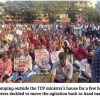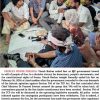Goa is abuzz with excitement as vintage bike and car owners, users, collectors and fans are decking […]

GOAN OR CASINO CULTURE?
LAW October 4, 2025By Olav Albuquerque
THE Revolutionary Goans Party (RGP) MLA, Viresh Borkar, is arguably one of the youngest in the Goa Assembly. He is only 32 and began his career in politics when he was 29 or thereabouts. His grandfather was a freedom fighter and inspired him to become a politician to serve the people.
He has alleged in the assembly that Goan culture is being swamped by the “casino culture” which is correct as casinos both on the river Mandovi and also on land have proliferated. These casinos are
one of the main sources of income for the Goa government. Successive political parties have promised to regulate this “casino culture” pushing the floating casinos on the river Mandovi deeper into the sea. But after coming to power, nothing has been done. He has also demanded in the Goa Assembly that the government should come out with a specific definition of who is a “Goan” – this will prevent
misuse of our liberal family laws by filmstars and money bags who register their marriages in Goa for ulterior motives.
UNPALATABLE TRUTH
VIRESH Borkar is speaking the unpalatable truth and he has absolute freedom of speech in the Goa assembly which is a settled principle of law. W cannot curb the freedom of speech of our elected representatives to regulate free speech. If we do so, freedom of speech will become a nullity which can be misused only by those in power to defame those who are unable to defend themselves in public.
How sensitive can public figures be to criticism? The US Supreme Court laid down as far back as 1966 in a celebrated case known as “New York Times” versus Sullivan that public figures cannot be oversensitive to criticism and even if the statements made against them were false, they should tolerate such criticism to ensure healthy debate. If they are allowed to file defamation suits indiscriminately, this would have a chilling effect on public discourse and inhibit the people’s right to know about what is happening around them.
The U.S. Supreme Court carved out an exception known as the “Absolute Malic Test” which declares that if a newspaper published a false statement about a public figure knowing fully well that it was false, then and only then would they be liable in court for destroying the image of this public figure.
Over the past 59 years, this test has stood the test of time.
The recent attack on Rama Kankonkar and the subsequent arrest of gangster Zenito Cardozo has sparked outrage throughout the country. Kankonkar was brutally attacked while with his friend, Soiru Velip, who has alleged that the Goa Police deliberately dragged its feet to conduct a site panchanama of the attack at 9.30 pm. Thereby, ensuring the evidence was diluted. This will protect some top person who has given a “supri” to gangster Zenito Cardozo to attack Rama Kankonkar. The Goa Police Act under the thumb of a powerful politician will never reveal the identity of who has given a “supari” or contract to Zenito Cardozo to attack Rama Kankonkar, although they have a record of the misdoings of this powerful politician.
In India, Subramanian Swamy, who is allegedly sometimes described as “motor mouth”; has made several allegations against the Gandhi family including Rahul Gandhi, some of which are laughable.
One ludicrous example being Swamy alleging that Rahul Gandhi was addicted to drugs. Subramanian Swamy filed Special Leave Petition in the Supreme Court pleading for the
de-criminalization of the law of defamation. The Supreme Court dismissed this plea with the
observation that defamation could not be decriminalized or taken out of the ambit of what was earlier the Indian Penal Code.
RECENT Supreme Court decisions have reinforced the principle that public figures, more so government officials, should be more tolerant of criticism than private citizens. The court distinguished between legitimate, even strongly worded criticism of public policy and malicious or factually false reporting that damaged the reputation of public figures.
The apex court has consistently opined that criticism is a necessary part of a healthy democracy and public figures should expect scrutiny. In 2016, the apex court told the late Tamil Nadu chief minister, J Jayalalitha, “You are a public figure and you have to face criticism.” It admonished the government for filing defamation suits to stifle dissent.
In March 2024, the apex court reiterated that citizens have the right to criticize state decisions, calling it an “expression of protest” protected under the right to live a dignified life. The court stressed that the test for inflammatory speech has its effect on “reasonable persons” who are not easily offended.
While upholding the right to criticize, the court, in the 2016 case of Subramaniam Swamy versus Union of India, confirmed that the right to reputation under Article 21 is reasonable restriction on free speech. But the Supreme Court has voiced concern over the government misusing criminal defamation laws to silence journalists and critics. In September 2025, the Surpeme Court hinted at the possibility of decriminalizing defamation, calling it a potential remnant of a colonial law.
In August 2025, the apex court directed the government to frame guidelines for content creation on social media. It clarified that free speech is protected, it cannot be weaponized on social media. It cannot disparage vulnerable groups. That implies that while that while political criticism is protected, discriminatory or hateful content, specially by commercial influencers is not immune from the law of defamation.
International watchdogs have hinted at the falling standards of free speech in India which has fallen to 151 out of 180 countries in the 2025 Press freedom Index compiled by Reporters Without Borders that places India within the “very serious” category.
(Dr Olav Albuquerque holds a PhD in law and is senior journalist-cum-advocate of the Bombay high court.)















